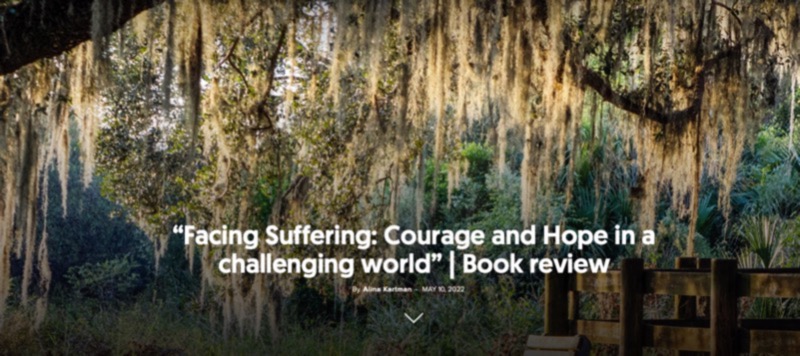The question of human suffering concerns atheists and believers alike. For the former, the search for an answer drives them to the heights of despair. For the latter, suffering inevitably poses a dilemma: why is there so much suffering in the world if the God who created it is loving and omnipotent?
It is easy to quote biblical texts that affirm the justice, love and power of the Creator. But how can their truthfulness be maintained in the face of the evidence of suffering?
Life in chains: All rivers flow to the sea…
We are born, we live, and we die in suffering. There is universal agreement on this. In fact, it could be argued that the essence of the human condition is suffering. Physical pain and inner turmoil are components of a fleeting existence. Speaking of the human condition, the wise Solomon wrote: “All their days their work is grief and pain; even at night their minds do not rest” (Ecclesiastes 2:23). And if there are pains that people learn to endure, there are also pains that seem unbearable and that torment the mind with the same question: why?
The discussion of human suffering often begins with the Holocaust. Countless pages have been written about the horrors of the “final solution”, from the Jew Primo Levi’s If This Is a Man to Elie Wiesel’s Night. In cold, stark language, Wiesel described the horrors he saw and endured in the camp. Babies burned in mass graves, women and old people killed like animals in a slaughterhouse, people kept naked in the freezing winter, children so dehumanised that they killed their parents for a bit of bread, people who prayed in silence and ended up losing their faith. Night ends dry and placid. After years of anguish and horror, on the eve of liberation, Wiesel lost his father without being able to say goodbye. “I didn’t weep,” he writes, “and it pained me that I could not weep. But, I was out of tears.”[1]
The wars in Iraq and Afghanistan, the killer waves that hit the shores of Asia in December 2004, the bombings of the World Trade Centre, Madrid and London, the bloody conflict in Gaza, the war in Ukraine, the genocides and ethnic cleansing in Bosnia, Rwanda, Cambodia, Darfur and many more, the millions of victims of drugs, alcohol, tobacco, epidemics, earthquakes, famine—all recent evidence of suffering in the world, evidence that makes many question whether what Christian theology says about God is true.
The theologian Millard Erickson distinguished between natural and moral evil. While moral evil (murder, abuse, war, discrimination, etc.) can be attributed to the wrong choices of beings endowed with intelligence and free will, natural evil (earthquakes, storms, floods, droughts, volcanic eruptions, disease and epidemics) seems to defy explanation. Why doesn’t God intervene to stop the phenomena that cause endless suffering? Abbé Pierre wrote: “I recently learned that around eight billion people have been born into the world. How many have had a painful existence, have had to struggle and suffer—and for what? Why, dear God, why?”[2] If God is a loving and almighty being, why is there suffering?
Rivers of suffering flow into the sea of history, and it seems that the sea is not yet full. When is this suffering going to end? And what is its purpose?
The Bible, a book about suffering
Suffering is present from the very first pages of the Bible. After the original couple, Adam and Eve, disobeyed God’s warnings and ate the fruit of the forbidden tree, suffering became part of human life. God said to the woman, “I will make your pains in childbearing very severe; with painful labour you will give birth to children. Your desire will be for your husband…” (Genesis 3:16). The man was told: “Cursed is the ground because of you; through painful toil you will eat food from it all the days of your life… By the sweat of your brow you will eat your food until you return to the ground, since from it you were taken; for dust you are and to dust you will return” (Genesis 3:17, 19).
As C.S. Lewis observed, “It would, no doubt, have been possible for God to remove by miracle the results of the first sin ever committed by a human being; but this would not have been much good unless He was prepared to remove the results of the second sin, and of the third, and so on forever.”[3] In the second generation—Cain and Abel—envy, anger and fratricide were already present.
The Old Testament prophets, writing primarily for their contemporaries, often referred to the problem of suffering as a consequence of sin. “I will punish the world for its evil, the wicked for their sins” (Isaiah 13:11). In the vision of the prophets, suffering was not the result of political, economic, and social circumstances, but the consequence of idolatry and breaking the moral law. The idea of suffering as the consequence and punishment of sin is evident on almost every page of the Old Testament prophetic writings. But the prophets did not say that suffering is always a consequence of sin. If the Divine has sometimes punished sin with drought, famine or pestilence, this does not mean that every drought, famine or pestilence is a direct intervention by God for punitive purposes.
The concern to reconcile divine love with the reality of suffering is so great that an important figure—the devil —is often lost sight of. Described in the Bible as “the prince of this world” (John 12:31; 14:30), “the god of this age” (2 Corinthians 4:4), and “the ruler of the kingdom of the air” (Ephesians 2:2), Satan is the one who contributes to the intensification of human suffering. The visionary John associated suffering with the devil’s evil work: “Do not be afraid of what you are about to suffer. I tell you, the devil will put some of you in prison to test you, and you will suffer persecution for ten days” (Revelation 2:10), and the apostle Peter warned believers that “your enemy the devil prowls around like a roaring lion looking for someone to devour. Resist him, standing firm in the faith, because you know that the family of believers throughout the world is undergoing the same kind of sufferings” (1 Peter 5:8-9).
Human history in a sentence
An old oriental story tells of a monarch who once commissioned his court historian to write a history of humanity. When he had written several dozen volumes, the historian presented himself to his majesty with “The Complete History of Mankind”. Very busy with political problems and wars with his neighbours, the monarch asked him to shorten it and halve the number of volumes.
History repeated itself a second time, and each time the historian appeared before the throne, he was asked to reduce the number of volumes because the monarch was busy. After many years, when the history of mankind had been rewritten in a single volume, the historian found the monarch old and ill and dying. He asked him to summarise the history of mankind in one sentence. “Your Majesty,” the historian whispered in the dying man’s ear, “people suffer and die.”
There are instances in the Bible where lepers, the blind, the deaf and the demon possessed have been healed. But God did not heal all the lepers, the blind, the deaf, and the demon possessed. There is ample biblical evidence that He can destroy evil and suppress suffering. However, according to the Bible, the complete removal of evil and suffering is postponed to a time unknown to mankind.
Life in chains: a Man accustomed to suffering
The long history of suffering is divided into two parts: before and after Christ, before and after the Cross. The incarnation of the Son of God is the gesture by which God showed the universe that He was not hiding somewhere in glory, leaving poor human beings to crawl in agony and pain. The Son of God took on human nature in order to suffer with those who suffer. In a well-known messianic prophecy, the prophet Isaiah describes Jesus Christ as “despised and rejected by mankind, a man of suffering, and familiar with pain. Like one from whom people hide their faces He was despised, and we held Him in low esteem. Surely He took up our pain and bore our suffering…He was pierced for our transgressions, He was crushed for our iniquities” (Isaiah 53:3-5).
If God is nothing more than man’s invention, then man has not only invented a God, but one who suffered infinitely more than the creature, than any creature He created.[4] One idea stands out clearly from Isaiah’s prophetic poem, namely that Jesus bore our pain and suffering. As an innocent Man, He took upon Himself the tears, the sorrows, and the punishment of the guilty, that is, of us.
“God not only shares our suffering, but makes it His own, bringing death into His life.” (Jürgen Moltmann, Christian theologian)
God knew human history in advance. He knew of man’s fall into sin and the sufferings of Jesus Christ. And yet He created! And this fact gives us confidence that beyond the history of the suffering world there will be a time of joy.
Top of the class in the “school of suffering”
Suffering, in its most severe forms, provokes at least two reactions. Some have turned against God, blaming Him or denying His existence. Others have seen suffering as a divine intervention in their lives. This was the case with Edith Stein (1891-1942), a German-born Jew who converted to Catholicism at the age of 29. Edith, who had joined the Carmelites, was arrested in August 1942 and taken to Auschwitz, where she died in the gas chamber. The note she sent to her superior before her arrival at the camp contained these words: Ave Crux, spes unica (“Hail to the Cross, our only hope”). If, at the beginning of the third millennium, suffering seemed to the individual more like “a requirement of Christian holiness,”[5] some of those who had been physically and spiritually maimed by suffering perceived it as a way in which God transformed their thinking and prepared them for their encounter with Him.
This was the understanding of the pastor and theologian Dietrich Bonhoeffer, who was part of the resistance movement against Nazism during the Second World War. Arrested in 1943, Bonhoeffer remained imprisoned until almost the end of the war. During his imprisonment, he wrote several letters and notes, which were published posthumously as Letters and Papers from Prison. “It is good to learn early enough,” Bonhoeffer wrote, “that suffering and God is not a contradiction but rather a necessary unity; for me the idea that God himself is suffering has always been one of the most convincing teachings of Christianity.”
Bonhoeffer was executed by hanging a month before Nazi Germany surrendered. One of the witnesses to the execution later said that before leaving the cell, Bonhoeffer knelt down and said a prayer.
“Suffering is evil and it should never be sought or exaggerated. But we can reach the highest levels of human emotion through the experience of suffering”—Abbé Pierre
The year 2009 was the centenary of the birth of the pastor Richard Wurmbrand (1909-2001), a man who accepted suffering as a school of Christ. Born in Bucharest, he converted to Christianity and spent 14 years in Communist prisons for his religious beliefs. He was tortured and starved, but came out of prison only to speak to the world about God’s love with an enthusiasm that he maintained until the end of his life. He was nicknamed the “Apostle Paul of the Iron Curtain”. The sufferings he endured did not alienate him from God, but strengthened his conviction that suffering is a way of imitating Christ and drawing closer to Him. “And we know that in all things God works for the good of those who love Him”, wrote the Apostle Paul (Romans 8:28), “because the Lord disciplines the one He loves, and He chastens everyone He accepts as His son. Endure hardship as discipline; God is treating you as His children” (Hebrews 12:6-7).
Suffering can be a means by which God corrects a human nature distorted by sin. Sometimes God is best seen through tearful eyes. This is not poetry, but the testimony of those who have met Him through suffering.
The end changes the perspective
The problem of suffering has no human solution. It is an equation with so many unknowns that only God can solve it. One can appreciate Erickson’s frank admission that “we should not set our expectations too high in endeavouring to deal with the problem of evil. This is a very severe problem, perhaps the most severe of all the intellectual problems facing theism.”[6]
Sometimes suffering is caused by disobedience to God. At other times, God tests people’s faith through suffering and pain. Some tribulations come to us precisely as a result of our faithfulness to God. For each of these situations we find examples in the Bible, but sometimes it is difficult to understand how human intentions, choices, and actions blend with divine intentions, choices, and actions. This difficulty stems from the qualitative distinction between Creator and creature. Human relationships are not a blueprint for understanding the relationship between humanity and God.
We cannot fathom the purpose or meaning of human suffering without a broader understanding of the history of this world. If God did not exist, the answer would be simple: we are a degenerate race with the instincts of wild animals, and the fittest survive. There is no meaning; there is no hope. But God does exist, and He created this world with His hands. Consequently, human history has a meaning that at least He knows. The world is moving towards a precise point. The Book of Revelation speaks explicitly of the end of this world, with all that it represents—hatred, war, murder, rape, suffering, death—and at the same time announces the establishment of a new reality: “Then I saw ‘a new heaven and a new earth’ for the first heaven and the first earth had passed away, and there was no longer any sea” (Revelation 21:1). In this renewed universe, God will “wipe every tear from their eyes. There will be no more death or mourning or crying or pain, for the old order of things has passed away” (Revelation 21:4).
The Book of Genesis tells the story of young Joseph, one of the twelve sons of the patriarch Jacob. Sold into slavery by his brothers, Joseph spent part of his youth working in the palace of an Egyptian master. He was later imprisoned on a fabricated charge. It is easy to assume that during all these years of bondage, injustice, and suffering, Joseph did not understand the purpose of the events of his life. Later, when by divine providence he became second in command to the Pharaoh of Egypt, his perspective on his own life changed.
When he met his brothers many years later, Joseph said to them: “And now, do not be distressed and do not be angry with yourselves for selling me here, because it was to save lives that God sent me ahead of you… So then, it was not you who sent me here, but God” (Genesis 45:5, 8). Joseph did not deny that his brothers’ intentions were evil. Their betrayal, motivated by envy and hatred, deserved to be punished. But he reassured them: “Do not be afraid. Am I in the place of God? You intended to harm me, but God intended it for good” (Genesis 50:20). The end changed the perspective of past events. The tormenting questions were answered and the suffering of youth was given meaning.




















